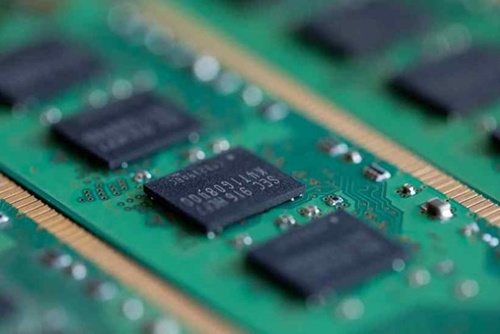Localities across the country have sped up ground clearance to provide clean sites to electronic and semiconductor firms, while the strategic transport system connecting economic hubs, seaports, and airports has been improved, the official said.
    |
 |
|
(Photo for illustration: Bloomberg) |
Local authorities have also been ready to provide favorable conditions in information technology as well as power, water supply services, and social infrastructure for workers in the industry, Dong said at the recent Vietnam Global Manufacturing Forum 2024 (VGMF2024) in Hanoi.
With the global electronics and semiconductor market expected to surpass 1 trillion USD by 2030, he said the Vietnamese Government and Prime Minister are directing the Ministry of Planning and Investment (MPI) and relevant ministries and agencies to prepare the best conditions to welcome incoming investments.
According to the official, Vietnam is currently among the top 40 economies in the world in terms of GDP with over 430 billion USD and the top 20 economies in international trade and foreign direct investment. The nation prioritizes projects in hi-tech fields like electronics, semiconductors, innovation, and renewable energy. It also seeks to develop international financial centers, modern services and trade, infrastructure, and research and development.
Dong also revealed an MPI-developed human resource development scheme specifically for the semiconductor industry. This scheme, targeting the training of 50,000 engineers by 2030, will be submitted to the PM for approval in the near future.
The National Innovation Centre (NIC), managed by the MPI, will focus on smart factory and urban development, digital communication, environmental technology, cybersecurity, semiconductor industry, hydrogen, and health care. Notably, it has already secured partnerships with US chipmakers Synopsys and Garden to establish a facility dedicated to chip research and design.
Furthermore, the MPI is drafting a decree on an investment support fund, offering substantial financial assistance for hi-tech, electronics and semiconductor sectors. This decree will be submitted to the Government for issuance soon.
Tran Tuan Anh, Deputy Director of the Hanoi Industrial and Export Processing Zones Authority (HIZA), unveiled the city’s goal of establishing 2-5 new industrial parks by 2025 to draw more investors, especially those using modern, clean, and eco-friendly technologies and producing highly competitive products to integrate seamlessly into the global value and supply chains.
Ranjit Thambyrajah, Founder and Managing Director of Acuity Funding advised Vietnam need to invest further in education and training to provide the industry with a competent workforce, while developing fully integrated and energy-neutral industrial parks suitable for the future of manufacturing. The expected increase in manufacturing and export activity will raise the need for more investment in infrastructure and logistics, he added.
Phan Huu Thang, President of the Institute for International Investment Studies (ISC), said that Vietnam has been a choice for many electronics “eagles” such as Intel, Bosch, Panasonics, Kyocera, Foxconn, Samsung, and LG. Their presence in Vietnam has shown that Vietnam’s business investment environment has improved significantly and is highly valued.
Source: VNA